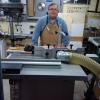I just recently started working with some 6/4 hard maple and am having some issues with burning on rip cuts. The burn marks are not along the whole edge, but just some areas. I checked the blade alignment and it seems ok. Also, I have the fence toed out slightly in the back. I also have the riving knife pretty much perfect with the blade. I'm using a Diablo 50 tooth combination blade. It leaves a really nice surface, except for the burn marks. I tried cleaning it, but that didn't seem to help. I tested out the stock 40 tooth general purpose blade that came with my saw to compare. The stock blade is not that great and I can tell by feeling the teeth that it's not that sharp. I ran a test piece through twice with zero burning. The surface quality was really poor with blade marks, and it also sounded like it was cutting poorly, but no burning.
It seems like it must be an issue with the blade. I was originally going to just get a ripping blade, but after testing the stock blade, am wondering if a better 40 tooth would be good enough. I'd rather not have to have dedicated blades and switch back and forth unless I really need to. Can 40 vs 50 tooth make that big of a difference with burning or is there something else going on with my blade? It hasn't been an issue on any other wood I've tested, but the saw is new and other than a bunch of test cuts, I haven't used it that much yet.




 Reply With Quote
Reply With Quote












